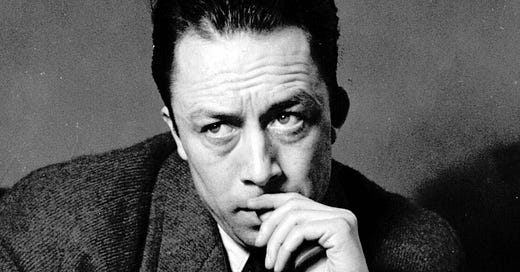✹ For today’s Wisdom Letter, we have carefully curated five bite-sized quotes from the French philosopher and author, Albert Camus (1913–1960), each paired with a philosophical question meant to provoke deep reflection:
Quote № 01:
“I, too, felt ready to start life all over again. It was as if that great rush of anger had washed me clean, emptied me of hope, and, gazing up at the dark sky spangled with its signs and stars, for the first time, the first, I laid my heart open to the benign indifference of the universe. To feel it so like myself, indeed, so brotherly, made me realize that I'd been happy, and that I was happy still.”
— Albert Camus
~ Follow-up Question:
How can the realization of the universe's indifference lead to a sense of kinship and happiness, and does this suggest that meaning can be found in accepting the absence of inherent meaning?
Quote № 02:
“There is but one truly serious philosophical problem and that is suicide. Judging whether life is or is not worth living amounts to answering the fundamental question of philosophy. All the rest – whether or not the world has three dimensions, whether the mind has nine or twelve categories – comes afterwards. These are games; one must first answer. And if it is true, as Nietzsche claims, that a philosopher, to deserve our respect, must preach by example, you can appreciate the importance of that reply, for it will precede the definitive act. These are facts the heart can feel; yet they call for careful study before they become clear to the intellect. If I ask myself how to judge that this question is more urgent than that, I reply that one judges by the actions it entails. I have never seen anyone die for the ontological argument.”
— Albert Camus
~ Follow-up Question:
The quote suggests that the importance of a philosophical question can be judged by the actions it entails. How should philosophy balance abstract inquiry with practical relevance, and does this diminish the value of purely theoretical questions?
Quote № 03:
“At this point of his effort man stands face to face with the irrational. He feels within him his longing for happiness and for reason. The absurd is born of this confrontation between the human need and the unreasonable silence of the world. This must not be forgotten. This must be clung to because the whole consequence of a life can depend on it. The irrational, the human nostalgia, and the absurd that is born of their encounter — these are the three characters in the drama that must necessarily end with all the logic of which an existence is capable.”
— Albert Camus
~ Follow-up Question:
If the absurd arises from the confrontation between human longing for meaning and the world’s silence, how should one respond to this realization? Does embracing the absurd lead to freedom, despair, or something else entirely?
✱✱✱
Support Philosophors:
buymeacoffee.com/philosophors
Quote № 04:
“Before the terrifying prospects now available to humanity, we see even more clearly that peace is the only goal worth struggling for. This is no longer a prayer but a demand to be made by all peoples to their governments — a demand to choose definitively between hell and reason.”
— Albert Camus
~ Follow-up Question:
If peace is the ultimate goal worth struggling for, does achieving it justify any means, or are there moral limits to the actions societies can take in pursuit of peace?
Quote № 05:
“The most elementary form of rebellion, paradoxically, expresses an aspiration for order.”
— Albert Camus
~ Follow-up Question:
If rebellion reflects a yearning for order, to what extent can acts of rebellion be seen as a constructive force in shaping new systems or values, rather than merely destructive or oppositional?
✽ Thank you for reading today’s Wisdom Letter.
✺ Support Philosophors!
Philosophors is a one-person labor of love, born out of my deep passion for wisdom. I’ve been fortunate enough to sustain this project through the generous donations of my audience, for which I’m incredibly grateful. If you would also like to support and help Philosophors thrive while remaining completely ad-free, please consider making a small donation and joining me on a mission to make wisdom more accessible.
✦ Donate Here → buymeacoffee.com/philosophors




Q1: it’s incredibly freeing when you realise you have no control and also that nobody gives a shit. (The trouble with this life approach is when you remember that various people do, in fact, give a shit - and you have to decide whether disappointing them is worth freedom.)
Question 1 response: My personal reaction to this question has been to place this assemblage of energy and transient matter that I identify as my self in co-equal context with other elements of The All, no less significant than any other part. The need for a teleological design fades away contemplating images of interstellar clouds on one hand and the amazing symmetries and asymmetries of other natural phenomena - including my own biological framework - on the other.